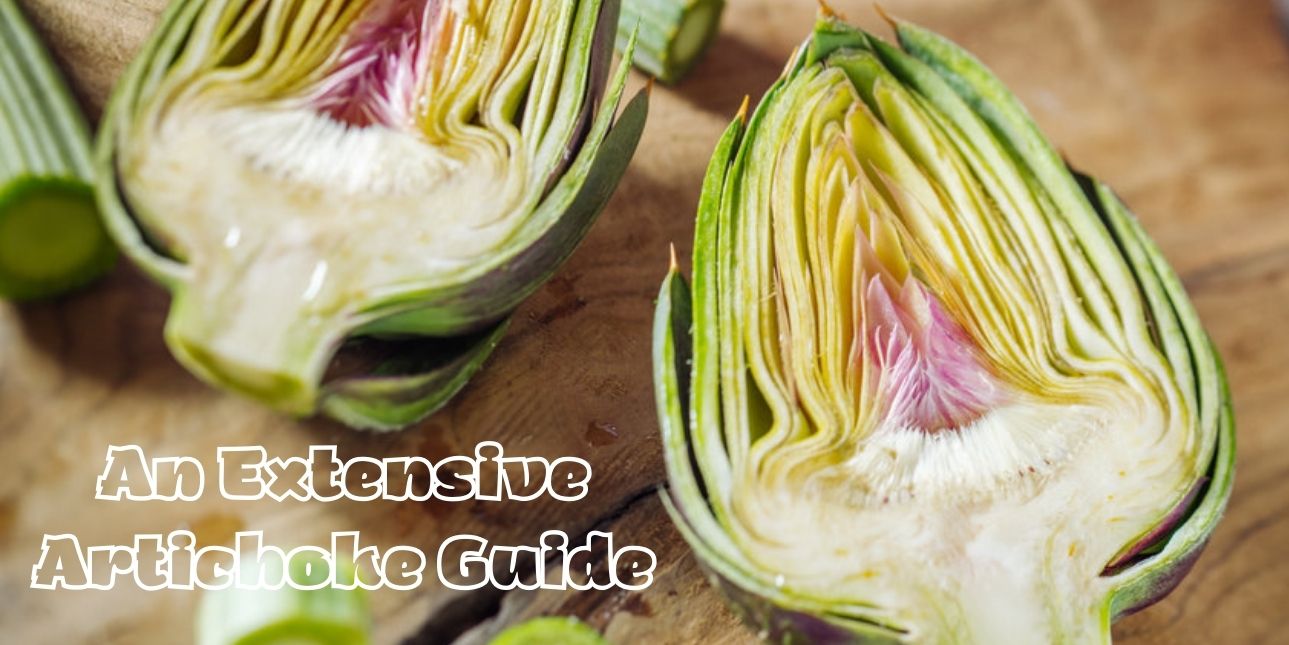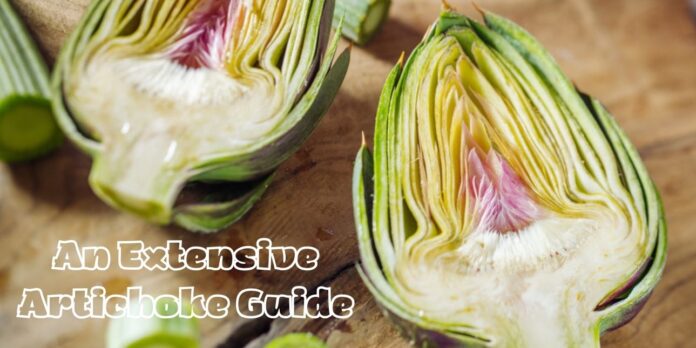Artichokes have a distinct, slightly nutty and earthy flavor with a slight bitterness.

Credit: www.walkinrefrigerators.com
The Artichoke Enigma
Artichokes, with their unique appearance and flavor, present a culinary enigma for many. The taste of an artichoke is often described as a mystery, as it offers a combination of textures and flavors that can be both delightful and perplexing.
Artichoke In A Nutshell
Artichokes are the edible flower buds of a thistle plant, known for their tender hearts and meaty leaves.
A Flavor Profile
- Bitterness: Artichokes have a slightly bitter taste, especially in the outer leaves.
- Sweetness: The inner leaves and heart of the artichoke offer a sweet and nutty flavor.
- Earthiness: Artichokes have a subtle earthy taste, similar to asparagus.
- Tenderness: When cooked properly, artichokes are tender and succulent.
Culinary Journey Of Artichokes
Artichokes have a fascinating culinary journey, evolving from their cultivation in ancient Mediterranean regions to becoming a beloved ingredient worldwide. Let’s explore the diverse flavors and uses of this unique vegetable.
From Field To Plate
Artichokes are harvested when they are still young and tender, typically in the spring. The edible part of the artichoke is the tender heart and the meaty base of the leaves. Once harvested, they are cleaned and trimmed before being cooked in various ways such as steaming, roasting, or grilling.
Artichokes Around The World
Artichokes are a versatile vegetable enjoyed in various cuisines globally. In Italy, they are often used in pasta dishes or as a pizza topping. In France, artichokes are a staple in traditional dishes like artichoke gratin. In the Middle East, stuffed artichokes are a popular delicacy. Each culture infuses its unique flavors into artichoke recipes.
The Taste Test
Curious about the taste of artichokes? With a distinct, slightly nutty flavor and a hint of earthiness, artichokes also have a subtle bitterness. Some liken the taste to asparagus, making them a unique addition to any dish.
First Impressions
When it comes to the taste test of artichokes, the first impressions are often surprising for many. The outer leaves have a slightly bitter and earthy flavor, which may not be what you expect from the appearance of the artichoke. As you move closer to the heart, the taste becomes more delicate and nutty, with a hint of sweetness. The overall experience is a combination of textures and flavors that can be quite unique and enjoyable.
Comparative Flavors
Comparing the flavor of artichokes to other foods, it can be likened to the taste of asparagus due to its mild and slightly earthy flavor. However, what sets artichokes apart is the presence of cynarin, a compound that inhibits the tongue’s ability to detect sweetness. This unique characteristic adds an intriguing dimension to the overall taste, making it a distinctive addition to any culinary experience.
Nutritional Benefits
Artichokes have a unique taste profile with a slightly nutty and earthy flavor, often described as mildly bitter. Some liken it to asparagus but with a distinctive twist.
Healthy Choice
Artichokes are a healthy choice due to their impressive nutritional benefits. They are low in fat and calories but high in fiber, making them a great option for those looking to maintain a healthy weight.
Artichokes are also a good source of essential nutrients such as vitamin C, vitamin K, folate, and potassium. These nutrients play a crucial role in supporting overall health and well-being.
Artichokes In Diets
Adding artichokes to your diet can provide various health benefits. They are rich in antioxidants, which help protect the body from oxidative stress and reduce the risk of chronic diseases.
The high fiber content of artichokes supports digestive health and can aid in weight management by promoting feelings of fullness and reducing overeating.
Cooking Techniques
Artichokes are a versatile and delicious vegetable that can be prepared in a variety of ways. Understanding the best cooking techniques is essential to bringing out the unique flavor and texture of artichokes. Whether you’re boiling, steaming, or grilling, the cooking method can greatly impact the taste and overall dining experience.
Preparing The Perfect Artichoke
Before cooking artichokes, it’s crucial to properly prepare them. Start by trimming the top and spiky outer leaves of the artichoke using a sharp knife or kitchen shears. Then, using a pair of kitchen scissors, trim the sharp points off the remaining outer leaves. Finally, trim the stem, leaving about half an inch attached to the base of the artichoke. Rinse the artichokes under cold water to remove any debris or dirt that may be trapped between the leaves.
Cooking Times And Tips
When boiling artichokes, place them in a pot of boiling water for approximately 25-40 minutes, depending on their size. For steaming, artichokes typically require 30-45 minutes. To check for doneness, insert a fork into the base of the artichoke; if it goes in easily, they are ready. To enhance the flavor, consider adding herbs, garlic, lemon, or olive oil to the cooking water. When grilling artichokes, it’s best to parboil them first to ensure they are tender and then finish them on the grill to achieve a smoky, charred flavor.

Credit: www.smh.com.au
Serving Suggestions
Artichokes have a unique flavor that pairs well with a variety of accompaniments and dishes. Here are some serving suggestions to make the most of the distinctive taste of artichokes.
Accompaniments And Pairings
Artichokes can be paired with a range of foods to enhance their taste. Here are some popular accompaniments and pairings:
- Herb Butter: Melted herb butter complements the earthy flavor of artichokes.
- Lemon Aioli: The tangy flavor of lemon aioli adds a zesty kick to steamed artichokes.
- Garlic Dip: A garlic-infused dip brings out the savory notes of artichokes.
- Grilled Meats: Grilled chicken or steak pairs well with artichoke dishes, creating a satisfying meal.
Innovative Artichoke Recipes
Experimenting with innovative recipes can introduce artichokes in new and exciting ways. Here are some creative recipes to explore:
- Artichoke and Spinach Dip: A creamy and indulgent dip that combines the flavors of artichokes and spinach.
- Artichoke and Feta Stuffed Chicken: A delectable dish where tender chicken is filled with a flavorful artichoke and feta cheese stuffing.
- Artichoke and Sun-Dried Tomato Pasta: A vibrant pasta dish featuring artichokes and sun-dried tomatoes for a burst of Mediterranean flavors.
- Grilled Artichokes with Balsamic Glaze: Grilled artichokes drizzled with a balsamic glaze for a delightful combination of smoky and sweet flavors.
The Unique Compound: Cynarin
Artichokes are known for their distinctive taste, partially attributed to the unique compound called cynarin. This compound is responsible for altering taste perception and creating a sweet aftertaste that sets artichokes apart from other vegetables.
Affecting Taste Perception
Cynarin in artichokes plays a crucial role in affecting taste perception by temporarily disabling the sweet receptors on the tongue. This temporary effect enhances the contrast of flavors, leaving a subtle sweetness lingering in the mouth after consumption.
Sweetness And Aftertaste
The sweetness and aftertaste experienced when eating artichokes can be attributed to the presence of cynarin. This compound not only enhances the overall flavor profile but also contributes to the unique culinary experience associated with artichokes.
Handling And Storing Artichokes
When it comes to handling and storing artichokes, it’s important to follow proper guidelines to maintain their freshness and flavor.
Selecting The Best Artichokes
- Choose artichokes that are firm and heavy for their size.
- Look for tightly packed leaves that are deep green with a slight purple hue.
- Avoid artichokes with dry or split leaves, as they may be past their prime.
Preservation For Freshness
Proper preservation is key to keeping artichokes fresh and flavorful:
- Store unwashed artichokes in a perforated plastic bag in the refrigerator.
- Artichokes can be kept fresh for up to a week when stored properly.
- For longer storage, blanch and freeze artichoke hearts in an airtight container.
Credit: www.creativejewishmom.com
Frequently Asked Questions
What Do Artichokes Do For The Body?
Artichokes contain chemicals that can reduce nausea, vomiting, spasms, and gas. These chemicals also lower cholesterol and protect the liver. They are commonly used for indigestion and high levels of cholesterol or other fats in the blood. Artichokes have a mild, nutty flavor with a slight bitterness and can be compared to asparagus.
The heart of the artichoke is completely edible and delicious. However, people with biliary obstruction or taking medication to lower blood pressure should avoid consuming them.
Why Do Artichokes Taste So Good?
Artichokes taste good due to the presence of cynarin, a chemical that temporarily disables sweet receptors, creating a contrast that leaves a sweet taste in the mouth. The taste is slightly nutty, earthy, and bitter. They are rich in chemicals that reduce nausea, vomiting, spasms, gas, and cholesterol, and protect the liver.
However, people with biliary obstruction or taking blood pressure medication should avoid them.
When Should You Not Eat An Artichoke?
Avoid eating artichokes if you have biliary obstruction or are taking blood pressure medications.
What Are You Technically Eating When You Eat And Artichoke?
When you eat an artichoke, you are technically eating the bud of a thistle—a flower. The leaves cover a fuzzy center called the “choke,” which sits on top of a meaty core, called the “heart. ” The heart is completely edible and has a delicious taste.
Conclusion
The taste of artichokes can be described as distinct, slightly nutty, and earthy with a hint of bitterness. Some liken it to asparagus but with a unique flavor profile. Whether boiled or cooked, artichokes offer a tangy and savory experience worth exploring.


